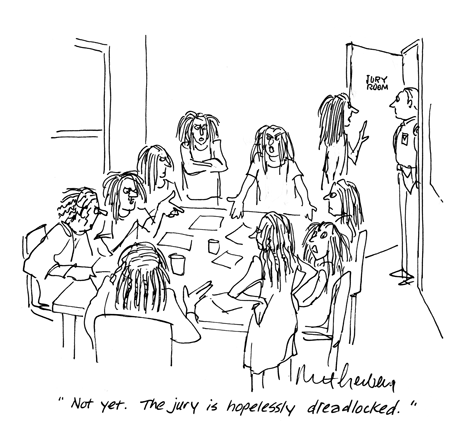
The Column of Lasting Insignificance: August 3, 2013
by John Wilcock
“A company that continues promoting and selling a drug after it is known to be dangerous may well end up being sued and paying out hundreds of millions of dollars in damages. However, this has no discernible deterrent effect because a really successful drug — a ‘blockbuster’ like Vioxx or Pfizer’s anticonvulsant Neurontin — makes profits… reckoned in the billions of dollars annually. Payment of damages can be calmly contemplated as one business expense among others.
— Stefan writing about Big Pharma in the Socialist Standard
TWELVE ABSENT MEN, as you may have guessed, is a story about the way juries have been disappearing from the legal system, although it offers no explanation for the recent Florida case when the jury was comprised of six members instead of the traditional twelve. “Until the early 20th century, the jury was the standard way Americans handled criminal cases,” writes Albert W. Dzur, “but today we operate largely without it. It has been supplanted by plea agreements, settlements, summary judgments, and other non-trial forums that are usually more efficient and cost-effective in the short term… In 2005, the Bureau of Justice Statistics reported that juries heard 4 percent of alleged criminal offenses brought before federal courts.” Needless to say, this is not exactly beneficial to the defendant because those who request a jury trial, says the Boston Review, may face “savage sentences as much as five times longer than they would have faced had they accepted a plea bargain.” In other words, judicial blackmail.
The sobering quality of juries is particularly needed now, writes Dzur, because such participation in criminal justice “brings otherwise attenuated people into contact with human suffering, draws attention to the ways that laws and policies and institutional structures prolong that suffering, and makes possible… awareness among participants of their own responsibility for laws and policies and structures that treat people humanely.”
How can the jury system be improved? His suggestions: that they be allowed to ask questions to clarify testimony and to take notes.

POLITICIANS HAVE NOT only detached themselves from reality but are increasingly trying to exempt themselves from examination. That’s the conclusion of an essay in the Columbia Journalism Review subtitled “Pols no longer need us more than we need them.” It examines the growing spectacle of corrupt congressmen who try to bypass the press. “Many elected representatives no longer view talking with independent reporters as part of their duty in American democracy,” writes James Rosen, “but rather as a privilege to be granted or withdrawn, as reward or punishment for coverage deemed favorable or unfavorable. It may not be a constitutional or even ethical obligation for pols to speak with journalists,” proclaims the writer, “but they have a civic responsibility to do so. That’s how our representative government works.”
GROSS NATIONAL HAPPINESS is an imaginary condition that Bhutan (pop: 717,000) has been hyping for at least a decade, as an alternative to pursuing economic growth. But it’s not much mentioned these days. “It’s such a con,” a skeptical resident told the Economist. “People are sick of the talk.”. Recent elections have brought out allegations of corruption among politicians in that country and the increasing dominance of neighboring India which supplies most goods, including food, owns all the hydropower plants, and buys the electricity. “Bhutan’s say over its own future is limited,” the mag concludes.
WALT DISNEY WORLD is the greatest monument that American culture has built to itself, writes the weekly Standard’s Eli Lehrer in a piece that describes the resort as “a secular pilgrimage site” and celebrates its 42nd birthday in October. He takes issue with critics who claim that it “reeks of inauthenticity, garishness, and just about everything that’s wrong with America.” A place of “near-religious significance,” it’s America’s largest single-site employer — more than 60,000 people work there — and welcomes 17 million visitors each year. Lehrer points out that every civilization builds its monuments: the Roman Forum, Egypt’s Karnak, the Palace of Versailles, soaring cathedrals and complexes like Chartres and York. “Hundreds or even thousands of years after these places were built, they are still places that people visit and study in enormous numbers. And Disney World is such a place.”
WHATEVER CHANGES MAY ensue from debate on the immigration laws, there’ll undoubtedly be an increase in ‘storefront coyotes’ — the crooked conmen who pretend to offer help to poor immigrants. That’s the view of Anne Kim who calls them a variation on “the notorious profiteers” who charge thousands of dollars to smuggle desperate immigrants across the border. In her story in the Washington Monthly, she emphasizes the difficulty of trying to find honest lawyers who dedicate themselves to helping illegals in contrast to giving them false advice, making errors in filing the application forms (or fail to file them at all). She points out that whereas a notorio publico is a qualified lawyer south of the border, its counterpart, a notary public, does not mean the equivalent in the U.S. “The current debate,” she suggests, “carries the seeds of a potential tragedy — the creation of a system so complex, so onerous and so likely to lead to the exploitation of immigrants that it might be more merciful not to pass any reform legislation at all.”
GOVERNMENTS ALWAYS SEEM to forget that things don’t happen in a vacuum. Stephen Pollard reminds us, and them, that the golden rule of public policy is the Law of Unintended Consequences. Take welfare policy, for example, which had the laudable aim of looking after those too poor to look after themselves. What it has actually given rise to, is a dependency culture which, in England, has resulted in six million people on out-of-work benefits, many of whom haven’t done a day’s work in their lives. Another example would be the “no win, no fee” arrangements for lawyers which was intended to make the legal system accessible to those who couldn’t afford to pay a lawyer upfront. But now a thousand people a day claim compensation for whiplash from a car accident, all reasoning that everybody else does it, nevertheless resulting in insurance rates rising 80% in the past five years. What triggered Pollard’s essay in the Spectator was news that the European Commission is about to ban three pesticides which are said to harm bees. The Law of Unintended Consequences, however, “will mean farmers will have to use older chemicals that are even more harmful to bees..and more expensive.”
THE WILCOCK WEB: At least eighty prisoners are said to have been cleared to leave Guantanamo. All that’s needed, apparently, is Obama’s okay. So why doesn’t he give it?…..How many more young American soldiers will die for nothing while we stay in Afghanistan, a fraudulent country that rips us off for billions, for another 18 months?….And another country whose government is corrupt from top to bottom is Bangladesh, which is run by its crooked garment makers….Now that highly combative SWAT teams, once rare, have infiltrated even small towns, maybe it’s time to reconsider the militarization of American policing suggests the New York Times….. Inc. ran a two-page spread exposing “the fake follower factory” where anybody can buy “followers” for as little as one cent each…. With a reported 225 million members, LinkedIn has reached “critical mass” is the opinion of Fortune which declares it to be the dominant global forum for businesses of all kinds. CEO Jeff Weiner “wants to connect everyone everywhere who has or wants a job in order to ‘match talent with opportunity’”….. ….“It is telling that there is no evidence, in all of history, of a miracle that has been validated by entities that are not affiliated with churches,” wrote Lawrence R. Krauss in the LATimes… Reading about the guy who kept a trio of homeless men locked in his garage for years so he could steal their social security checks, reinforces the proposal that whipping would be more suitable than prison for those convicted of violent crimes….What an easy excuse shady financiers like billionaire Steven A. Cohen have when denying knowledge about larcenous emails they received: they just didn’t read them….Determined to compete with Amazon’s two-day delivery, more and more big retailers such as Home Depot and Walmart are offering one-day delivery.…, “It’s the therapy of movie-making that has been good in my life…very therapeutic,” Woody Allen told the Wall Street Journal. “Solvable problems that are delightful puzzles, as opposed to the great puzzles of life that are very unsolvable or have very bad solutions”….In his book, The Collaborator: Hollywood’s Pact with Hitler, Ben Urwand tells how Jewish studio bosses in the 1930s rolled over accommodating the wishes of visiting Nazi officials to excise Jews from film scripts…. When will New York’s Whitney Museum have the sense to give artist Ed Ruscha a well-deserved retrospective?…….

Slow in giving is next to refusing (French proverb)…. Phasing out Britain’s tall, red telephone boxes has seen them converted around the world into such things as showers, gadget-charging stations, wifi hotspots, cash machines, book exchanges, even miniature pubs….Being tested in Brazil is an interactive beer glass (computer chip in the bottom) that when touched with a similar glass installs both drinkers in Facebook…….The humiliated Huma Abedin could do New Yorkers a favor by withdrawing support from her sex-fiend husband Anthony Weiner before he becomes mayor…..“It’s hard to see why poor, corrupt Croatia should be in the E.U.,” writes De Volkskrant’s Jan Hunin. “The EU is starting to look like the UN; the bigger it gets, the weaker it becomes”…..Howard Stern didn’t do himself a favor by becoming a judge on America’s Got Talent. Before he took that job, he was a legend to millions who’d heard him but never seen him. Now he just seems to be an egotistical show-off…“It’s easier to imagine the end of the world than to imagine the end of capitalism,” gloomily forecasts philosopher Fredric Jameson (1934– )
